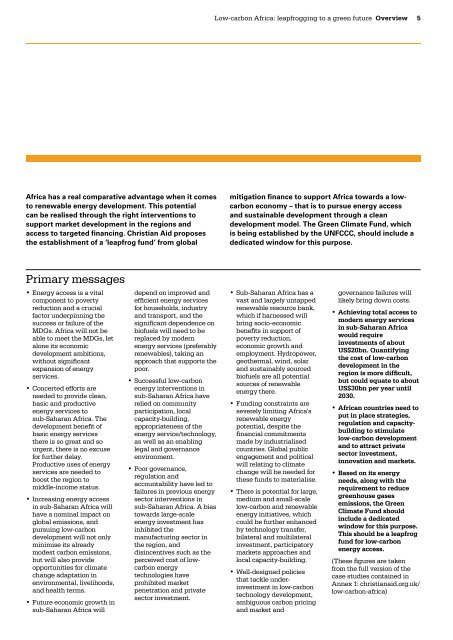Ju8uG
Ju8uG
Ju8uG
Create successful ePaper yourself
Turn your PDF publications into a flip-book with our unique Google optimized e-Paper software.
Low-carbon Africa: leapfrogging to a green future Overview<br />
5<br />
Africa has a real comparative advantage when it comes<br />
to renewable energy development. This potential<br />
can be realised through the right interventions to<br />
support market development in the regions and<br />
access to targeted financing. Christian Aid proposes<br />
the establishment of a ‘leapfrog fund’ from global<br />
mitigation finance to support Africa towards a lowcarbon<br />
economy – that is to pursue energy access<br />
and sustainable development through a clean<br />
development model. The Green Climate Fund, which<br />
is being established by the UNFCCC, should include a<br />
dedicated window for this purpose.<br />
Primary messages<br />
• Energy access is a vital<br />
component to poverty<br />
reduction and a crucial<br />
factor underpinning the<br />
success or failure of the<br />
MDGs. Africa will not be<br />
able to meet the MDGs, let<br />
alone its economic<br />
development ambitions,<br />
without significant<br />
expansion of energy<br />
services.<br />
• Concerted efforts are<br />
needed to provide clean,<br />
basic and productive<br />
energy services to<br />
sub-Saharan Africa. The<br />
development benefit of<br />
basic energy services<br />
there is so great and so<br />
urgent, there is no excuse<br />
for further delay.<br />
Productive uses of energy<br />
services are needed to<br />
boost the region to<br />
middle-income status.<br />
• Increasing energy access<br />
in sub-Saharan Africa will<br />
have a nominal impact on<br />
global emissions, and<br />
pursuing low-carbon<br />
development will not only<br />
minimise its already<br />
modest carbon emissions,<br />
but will also provide<br />
opportunities for climate<br />
change adaptation in<br />
environmental, livelihoods,<br />
and health terms.<br />
• Future economic growth in<br />
sub-Saharan Africa will<br />
depend on improved and<br />
efficient energy services<br />
for households, industry<br />
and transport, and the<br />
significant dependence on<br />
biofuels will need to be<br />
replaced by modern<br />
energy services (preferably<br />
renewables), taking an<br />
approach that supports the<br />
poor.<br />
• Successful low-carbon<br />
energy interventions in<br />
sub-Saharan Africa have<br />
relied on community<br />
participation, local<br />
capacity-building,<br />
appropriateness of the<br />
energy service/technology,<br />
as well as an enabling<br />
legal and governance<br />
environment.<br />
• Poor governance,<br />
regulation and<br />
accountability have led to<br />
failures in previous energy<br />
sector interventions in<br />
sub-Saharan Africa. A bias<br />
towards large-scale<br />
energy investment has<br />
inhibited the<br />
manufacturing sector in<br />
the region, and<br />
disincentives such as the<br />
perceived cost of lowcarbon<br />
energy<br />
technologies have<br />
prohibited market<br />
penetration and private<br />
sector investment.<br />
• Sub-Saharan Africa has a<br />
vast and largely untapped<br />
renewable resource bank,<br />
which if harnessed will<br />
bring socio-economic<br />
benefits in support of<br />
poverty reduction,<br />
economic growth and<br />
employment. Hydropower,<br />
geothermal, wind, solar<br />
and sustainably sourced<br />
biofuels are all potential<br />
sources of renewable<br />
energy there.<br />
• Funding constraints are<br />
severely limiting Africa’s<br />
renewable energy<br />
potential, despite the<br />
financial commitments<br />
made by industrialised<br />
countries. Global public<br />
engagement and political<br />
will relating to climate<br />
change will be needed for<br />
these funds to materialise.<br />
• There is potential for large,<br />
medium and small-scale<br />
low-carbon and renewable<br />
energy initiatives, which<br />
could be further enhanced<br />
by technology transfer,<br />
bilateral and multilateral<br />
investment, participatory<br />
markets approaches and<br />
local capacity-building.<br />
• Well-designed policies<br />
that tackle underinvestment<br />
in low-carbon<br />
technology development,<br />
ambiguous carbon pricing<br />
and market and<br />
governance failures will<br />
likely bring down costs.<br />
• Achieving total access to<br />
modern energy services<br />
in sub-Saharan Africa<br />
would require<br />
investments of about<br />
US$20bn. Quantifying<br />
the cost of low-carbon<br />
development in the<br />
region is more difficult,<br />
but could equate to about<br />
US$30bn per year until<br />
2030.<br />
• African countries need to<br />
put in place strategies,<br />
regulation and capacitybuilding<br />
to stimulate<br />
low-carbon development<br />
and to attract private<br />
sector investment,<br />
innovation and markets.<br />
• Based on its energy<br />
needs, along with the<br />
requirement to reduce<br />
greenhouse gases<br />
emissions, the Green<br />
Climate Fund should<br />
include a dedicated<br />
window for this purpose.<br />
This should be a leapfrog<br />
fund for low-carbon<br />
energy access.<br />
(These figures are taken<br />
from the full version of the<br />
case studies contained in<br />
Annex 1: christianaid.org.uk/<br />
low-carbon-africa)


